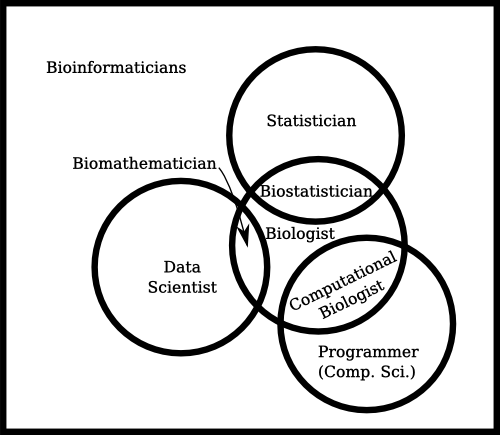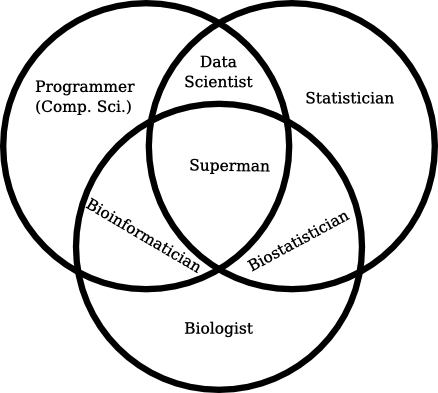I’ve been participating in an interesting conversation on linkedin, which has re-opened the age old question of what is a bioinformatician, which was inspired by a conversation on twitter, that was later blogged. Hopefully I’ve gotten that chain down correctly.
In any case, it appears that there are two competing schools of thought. One is that bioinformatician is a distinct entity, and the other is that it’s a vague term that embraces anyone and anything that has to do with either biology or computer science. Frankly, I feel the second definition is a waste of a perfectly good word, despite being a commonly accepted method.
That leads me to the following two illustrations.
How bioinformatics is often used, and I would argue that it’s being used incorrectly.:
And how it should be used, according to me:
I think the second clearly describes something that just isn’t captured otherwise. It covers a specific skill set that’s otherwise not captured by anything else.
In fact, I have often argued that bioinformatician is really a position along a gradient from computer science to biology, where your skills in computer science would determine whether you’re a computational biologist (someone who applies computer programs to solve biology problems) or a bioinformatician (someone who designs computer programs to solve biology problems). Those, to me, are entirely different skill sets – and although bioinformaticians are often those who end up implementing the computer programs, that’s yet another skill, but can be done by a programmer who doesn’t understand the biology.
That, effectively, makes bioinformatician an accurate description of a useful skill set – and further divides the murky field of “people who understand biology and use computers” – which is vague enough to include people who use an excel spreadsheets to curate bacterial strain collections.
I suppose the next step is to get those who do taxonomy into the computational side of things and have them sort us all out.




I found this page on a post on Facebook. The argument is very interesting but unfortunately very poorly discussed. The only point on which I can agree is that the first figure is wrong. Unfortunately, also the second is in my opinion is wrong. The data scientist is someone is exactly the Superman you are mentioning. There is no data science without a knowledge of the application field you are addressing (in this particular instance, biology).
In the text, the definition of computational biologist is “someone who applies computer programs to solve biology problems”, and bioinformatician is “someone who designs computer programs to solve biology problems”. Here methodologies are completely missing. Any computer program implements an algorithm. If the computer program implements some form of numerical algorithm to compute a mathematical model, this is called computational biology. Computational biology. Giving a look at wikipedia for definitions does not hurt, and reduces the noise of useless web pages.
Wow Mario,
Not sure what you were looking for. In what way is it poorly discussed? Your discussion of my lack of discussion is not discussed in your post.
Also, your point suggests that data scientists are all biologists, which I would fundamentally disagree with. It also suggests that all bioinformaticians must be specialists in statistics/math, programming and biology – which is far from the case. If it were, then there wouldn’t be nearly as many people calling themselves bioinformaticians as there are.
As for the rest of your argument, it’s confusing implementation with design – which was exactly the point I was trying to make. Any programmer can implement an algorithm, but it requires knowledge of two fields to design one.
Was your tone intentionally rude, or are you just trying to troll me? I would implore you to read the article before you comment next time – I generally don’t delete comments, but flame wars are just useless noise.
Cheers!
‘Your discussion of my lack of discussion is not discussed in your post.’
Hhahahaa, loved that line.
The second figure is how I see things too. In the third one it might be clearer to add the Biologist further to the left and the Computer Scientist further to the right on the existing axis, if I understand it correctly.
Thanks – and I like your suggestions on fixing the third graph. I was least happy with that one, but couldn’t figure out what the right solution would be.
this should clear the air:-
http://www.biocodershub.net/community/call-yourself-a-bioinformatician-then-learn-to-program/
Not sure why you think that clears the air, smk. There are a lot of people who call themselves bioinformaticians that I would assert don’t really understand programming, and the post you’ve linked to more or less makes the same point. I would say there are biologists who believe they can code, and there are coders who believe they know biology (but don’t…) and somewhere in the middle are bioinformaticians, who should know both.
Haha, I define myself as a computational biologist but defined as ‘superwoman’ in your second plot. To work as a computational biologist you need to know stats, programming and biology, but your level of exact expertise in either one can vary. Either way, I find this discussion and these definitions not particularly useful. The only good part might be that ‘pure’ statisticians, programmers and biologists might all for once UNDERSTAND that one can do stats/programing/biology without a classical education in either. We are talking about science here, in science we are in the quest for knowledge and we solve problems – with whatever tools necessary, and we will acquire the knowledge and build the tools needed (because no one else will).
I am so sick an tired at getting bashed by programmers who think I should not program unless I have a degree in computer science, or statisticians who think I should not do statistics but get the help of ‘the department statistician’ (who apparently is believed to always exist and understand what I am doing, aka biological questions). In this day and age you need a mixed skill set. You do not need to have a master in all of statistics, computer science, biology and be an MD. That would be a waste of time for the specific topic you are studying.
Hi Boel,
Actually, I really agree with some of your main points – I was trying to steer clear of saying you need a degree in any of those subjects to be good at it – I myself never obtained a formal computer science background, but I would consider myself to be a good programmer, after several decades of experience. Not that I don’t have more to learn, but I’m clearly more a bioinformatician than a computational biologist, using my own definitions.
Anyhow, I’m more than happy to call you superwoman… and may have to ask your opinion on some stats problems I’m facing sometime. (-:
And finally, no, these discussions don’t really do much except help us clarify what skills we’re looking for, and perhaps harmonize a fragmented informatics field that can’t decide what bioinformatics really entails. But hey, without taxonomy, it’s always harder to see the big picture, let alone communicate it to others.
great..i like this discussion..yesterday i joined this page n got this interesting post..i m doing bs bioinformatics n very new in this field knowing little about it..i hope this page would b very helpful for me to know more about what the bioinformatics is..
Interesting discussion. I just step into the field of bioinformatics and having a slight hard time to define/describe what I do to my family and friends. The most often description I use is “using computer programs to investigate biological topics”.
It seems that this page holds the more limited view of what a bioinformatician is, without acknowledge that there’s a difference between “applied” and “computational” bioinformaticians, where the former “use” or “tweak”, to an extend , of the existing methods/programs to do research, and the latter develops the method/programs. So I wouldn’t say it’s wrong, just different views.
But either way, it is probably our ultimate goal to learn and become the superman~
Hi Oscar,
Interesting point that you raise, dividing bioinformaicians into those who “tweak” and those who develop the programs. I would probably default back to my division of the former being a computational biologist, and the later being a bioinformatician. However, I’m sure not everyone is comfortable with the two terms, as I’ve used them. I meant the post to be food for thought, and to contribute a visual representation to the discussion, and I hope it’s done that.
Hmm…oh taxonomy. I’ve spent my whole academic career up until now (undergrad+grad) in “interdisciplinary” pursuits and much like speciation, I think there are no ‘clear divisions’ between these fields/titles. Hell, I work on protein structure informatics where physics and chemistry get blurred into the fold in a just-as-confusing way. I’ve taken 1 Computer Science course but have spent most of the last 3 years programming. When I transitioned into a biology department, I felt the sting of many ‘purists’ telling me that my background/knowledge/skills were ill-placed…but the fundamental argument was simply a deference to tradition. No one could tell me what made a ‘biologist’ vs a ‘chemist’ or a ‘data scientist’ etc.
While all language is dynamic, I think that seeking abstract definitional boundaries, whether heuristic or historical, misses the point. We simply don’t know what to call ourselves. These terms are highly overlapping and far from mutually exclusive. Some of us slant more towards one or the other, but that does not preclude the use of any of these titles.
That being said, I am merely stating an opinion and I respect your endeavour to find such disciplinary boundaries. It would be great if we didn’t have to answer questions about what we should be called with “it’s complicated”.
Have you considered a topic parsing or textmining approach?
http://slackprop.wordpress.com/2013/06/03/on-geek-versus-nerd/
is a wonderful example of a quick investigation of highly overlapping colloquial terms
Awesome comment – and I completely agree with all of your points, but we still have the obligation to define the approximate boundaries of the field, if for no other reason than clear communication. I don’t expect to convince anyone to drop their preconceived notions about what they call themselves, especially given the “traditions” that have popped up in different places.
I do hope that we’ll spark a bit more conversation that leads a few people to make some attempt to harmonize what we mean when we say “bioinformatician”.
btw, love the idea of doing a textmining approach. If I have the time, I’ll give that a try!
Anthony
I guess the 3rd picture (grasp of Computational Subjects) is the opposite.Computational biologists make the algorithms&tools and have more exposure to computation,Bioinformaticians use the tools and have more exposure to biology